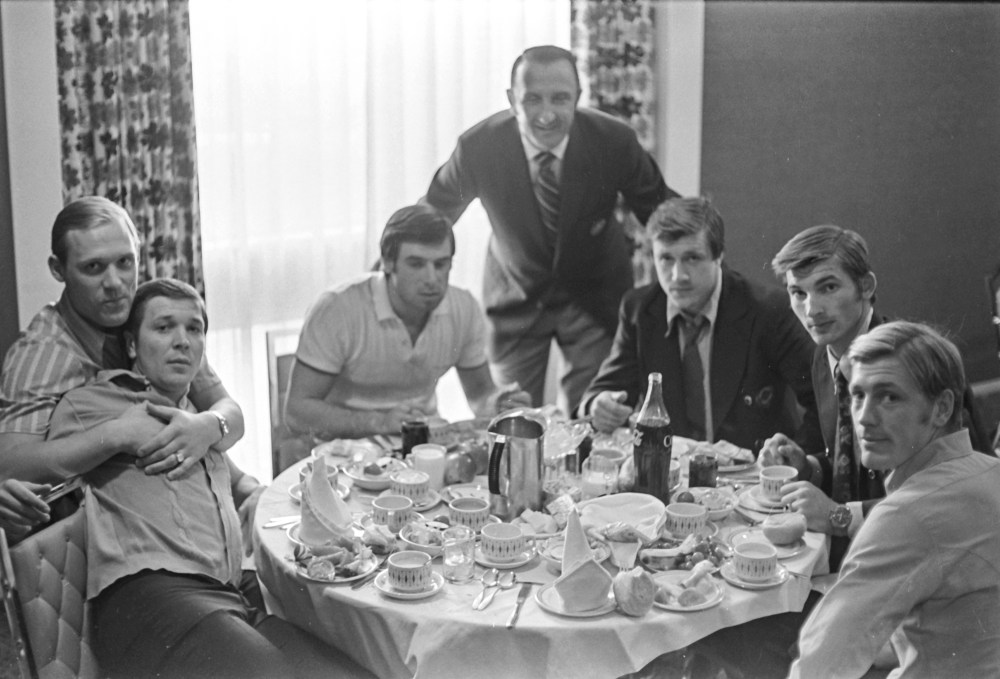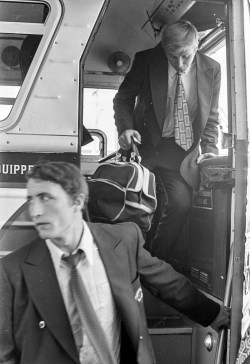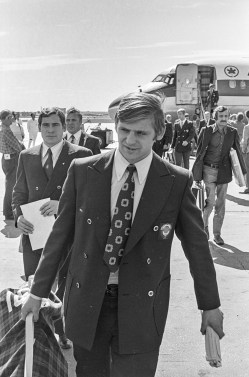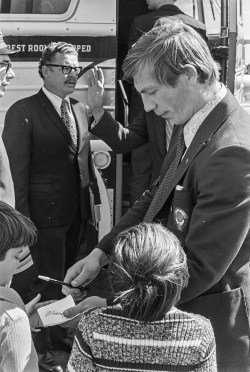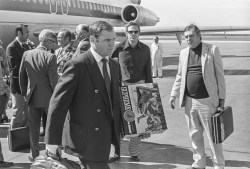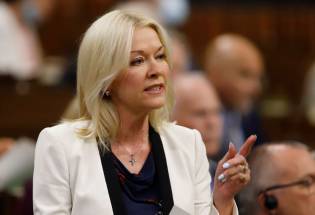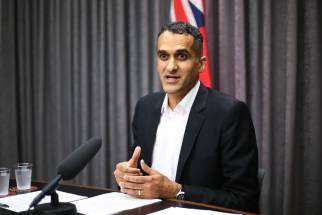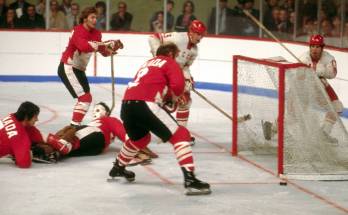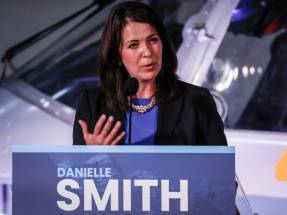‘Where were you in ’72?’ CBC series uses new interviews, archival footage and home movies to dig into one of Canada’s most enduring hockey memories
Read this article for free:
or
Already have an account? Log in here »
To continue reading, please subscribe:
Monthly Digital Subscription
$0 for the first 4 weeks*
- Enjoy unlimited reading on winnipegfreepress.com
- Read the E-Edition, our digital replica newspaper
- Access News Break, our award-winning app
- Play interactive puzzles
*No charge for 4 weeks then price increases to the regular rate of $19.00 plus GST every four weeks. Offer available to new and qualified returning subscribers only. Cancel any time.
Monthly Digital Subscription
$4.75/week*
- Enjoy unlimited reading on winnipegfreepress.com
- Read the E-Edition, our digital replica newspaper
- Access News Break, our award-winning app
- Play interactive puzzles
*Billed as $19 plus GST every four weeks. Cancel any time.
To continue reading, please subscribe:
Add Free Press access to your Brandon Sun subscription for only an additional
$1 for the first 4 weeks*
*Your next subscription payment will increase by $1.00 and you will be charged $16.99 plus GST for four weeks. After four weeks, your payment will increase to $23.99 plus GST every four weeks.
Read unlimited articles for free today:
or
Already have an account? Log in here »
Hey there, time traveller!
This article was published 06/09/2022 (1195 days ago), so information in it may no longer be current.
Fifty years ago today, Winnipeg played a part in one of Canada’s greatest cultural touchstones.
TV Preview
Summit 72
- Sept. 14, Sept. 21, Sept. 28 and Oct. 5, 8 p.m.
- CBC and CBC Gem
It was Game 3 of what was called the Summit Series, an eight-game hockey showdown in the middle of the Cold War between Canada’s NHL stars and the Soviet Union national team, perennial winners of the world hockey championships.
Games 1 and 2, held the previous Saturday and Monday at the Montreal Forum and Maple Leaf Gardens in Toronto, respectively, revealed to all the Soviet team’s hockey ability, Canada’s overconfidence and the lack of fitness of the NHLers, as well as their determination.
Vladislav Tretiak tries to see past J.P. Parisé during a delayed penalty in Game Two of the Summit Series at Maple Leaf Gardens in Toronto on Sept. 4, 1972. (Hockey Hall of Fame)
The Soviets won the first game in shocking fashion, 7-3; Canada took the second 4-1.
Gary Cribbs was a 37-year-old food broker, the president of the Manitoba Junior Hockey League’s St. James Canadians and a fan. On that Wednesday evening, Cribbs and his wife Carol took their seats near the blueline at the Winnipeg Arena for the big game.
“I don’t know how I got the tickets,” he says, figuring he might have scored them through his connections with the MJHL.
https://www.youtube.com/watch?v=P0xOsM2sulI
“It was exciting and it was surprising because of the results we had seen from Montreal and Toronto before coming to Winnipeg, because the Soviets were better than forecasted,” Cribbs says of the game, which ended up a 4-4 tie. “Yes, the Winnipeg Arena was rocking with excitement.
“They (the Soviets) had a completely different system than the NHL had played against and I think by the time the guys got to Moscow they had adjusted accordingly and played their game, and a tough game it was.”
Former president of the Manitoba Hockey Hall of Fame, Gary Cribbs, points to the roster lists of the Canada versus USSR game (Mike Sudoma / Winnipeg Free Press)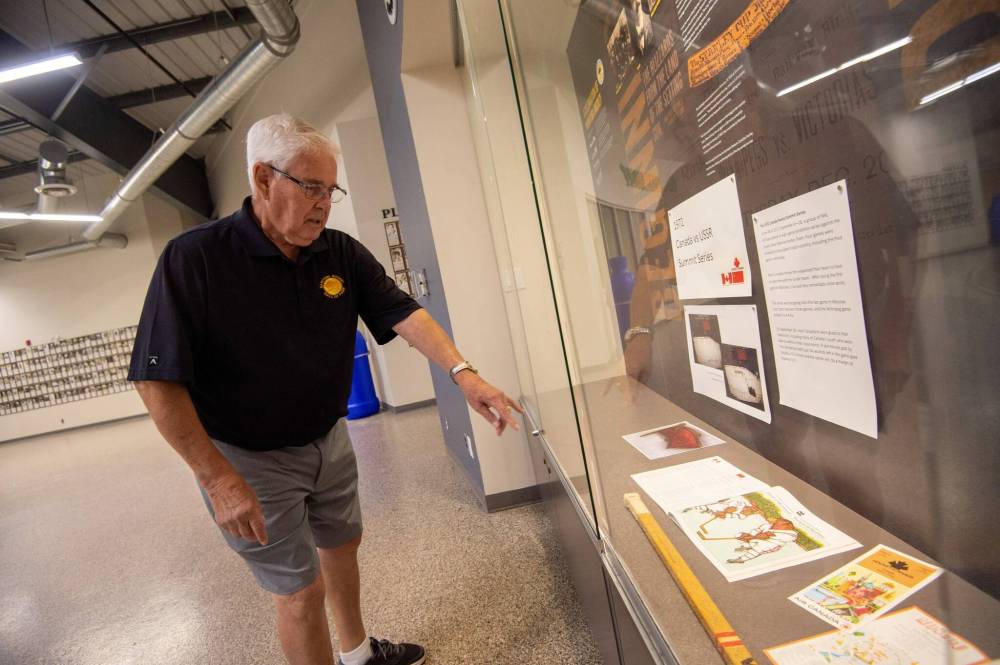
Memories might have dimmed over the years, but forgive Cribbs, who has played and watched thousands of hockey games during his lifetime as a supporter and builder of the game in Winnipeg. His efforts have earned him a place in the Manitoba Hockey Hall of Fame.
He says it was the first time for many Winnipeggers to see NHL stars in person — the Jets wouldn’t enter the NHL until 1979 — so many were looking forward to watching greats such as Phil Esposito and Yvan Cournoyer, or players like Bobby Clarke and Gary Bergman, who played junior hockey in Winnipeg.
“Clarke was never an angel, let’s put it that way,” he says. “He was a force in that series.”
Gary Bergman clears a loose puck with Boris Mikhailov and Valery Kharlamov in close pursuit as Brad Park falls on top of goaltender Tony Esposito during Game Three of the Summit Series in Winnipeg on Sept. 6, 1972. (Hockey Hall of Fame)
The Winnipeg game might be the least remembered of the Summit Series — there was no winner — but a new documentary series focusing on the Summit Series shows off sights from the arena as it was in 1972, festooned with giant Canadian and Manitoba flags flanking the famous portrait of Queen Elizabeth II.
Bobby Orr being interviewed wearing a practice jersey in 1972. (72 Summit Productions Inc.)
Summit 72, a new four-part series produced by Mercury Films and Impossible Objects for the CBC, begins Sept. 14 and airs every Wednesday evening after that, with the series climax to be shown Oct. 5.
The first episode, Hockey Nations, sets the scene of the NHLers’ lackadaisical training regime prior to the series and how the Soviets’ fast-paced style left them breathless in Game 1.
Besides players’ memories — Phil Esposito’s storytelling skills and charisma remain as lovable as ever at age 80 — there is remastered footage from the games, archival material and old home movies, along with thoughts from a large segment of Canada’s cultural mosaic who’ve been inspired by Team Canada’s series victory.
Team Canada player Serge Savard’s memories of Maurice (Rocket) Richard’s photo in his childhood home hanging alongside a picture of the Pope are neatly interspersed with those of Vancouver broadcaster Farhan Lalji, whose family moved to Canada shortly before the series, and Vicky Sunohara, an Olympic gold medallist for Canada’s women’s team who was introduced to hockey by her father.
Players shake hands after a hard-fought 4-4 tie in Game Three of the Summit Series in Winnipeg on Sept. 6, 1972. (Hockey Hall of Fame)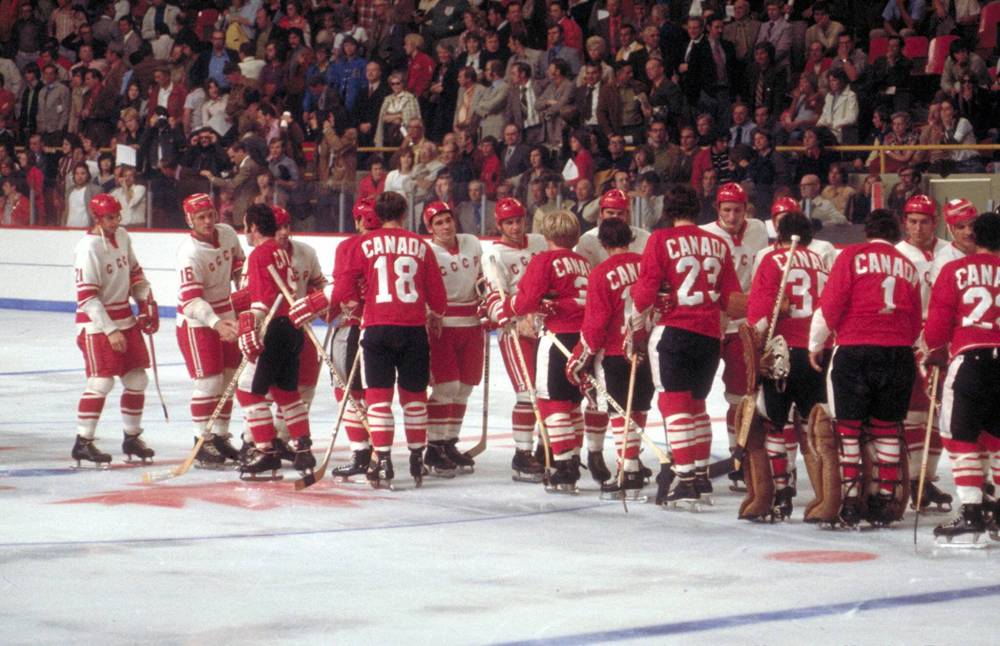
“Even assembling this documentary, it was working on kind of a quiltwork of impressions of that time,” says Dave Bidini, the vocalist-guitarist for Toronto band the Rheostatics who has also become one of Canada’s leading sports historians, and who is a writer and musical director for the series. “Often we had to rely on the players to communicate what it was like, because for a lot of us of that generation, it was a patchy memory of childhood.
“I think a lot of them at their age… it’s a bit of a last chance to open the lens on that time and set the record straight.”
Previous Summit Series documentaries have been presented as traditional sports fare, leaning heavily on interviews and highlights. While Summit 72 has that too, it also ventures into artistic interpretation, with Bidini adding The Traitor by Montreal singer and poet Leonard Cohen as a background to a montage of pinpoint Russian passes and goals at the Forum in Game 1.

The discovery of old 16mm footage from a never-produced documentary also provides new behind-the-scenes views of the series, including the NHL players goofing off in training camp instead of doing their exercises.
New interviews with the series’ Russian stars, such as Alexander Yakushev and Vladislav Tretiak, were held by a separate crew in Moscow because the COVID-19 pandemic prevented Canadian crews from travelling to Russia in 2020 and 2021.
They also took place months before Russia’s invasion of Ukraine, which has blighted relations between the Canada and Russia far beyond the Cold War’s fear-filled days in 1972, Bidini says.
“The Russian presence, their shadow on the world when it came to being a nuclear power, it terrified me at that age,” he says. “I think the two eras are comparably horrific, really. As a kid I was taught to be terrified of them and we were.”
Vladislav Tretiak watches the puck during Game Four action of the Summit Series on Sept. 8, 1972 at Pacific Coliseum in Vancouver. (Hockey Hall of Fame)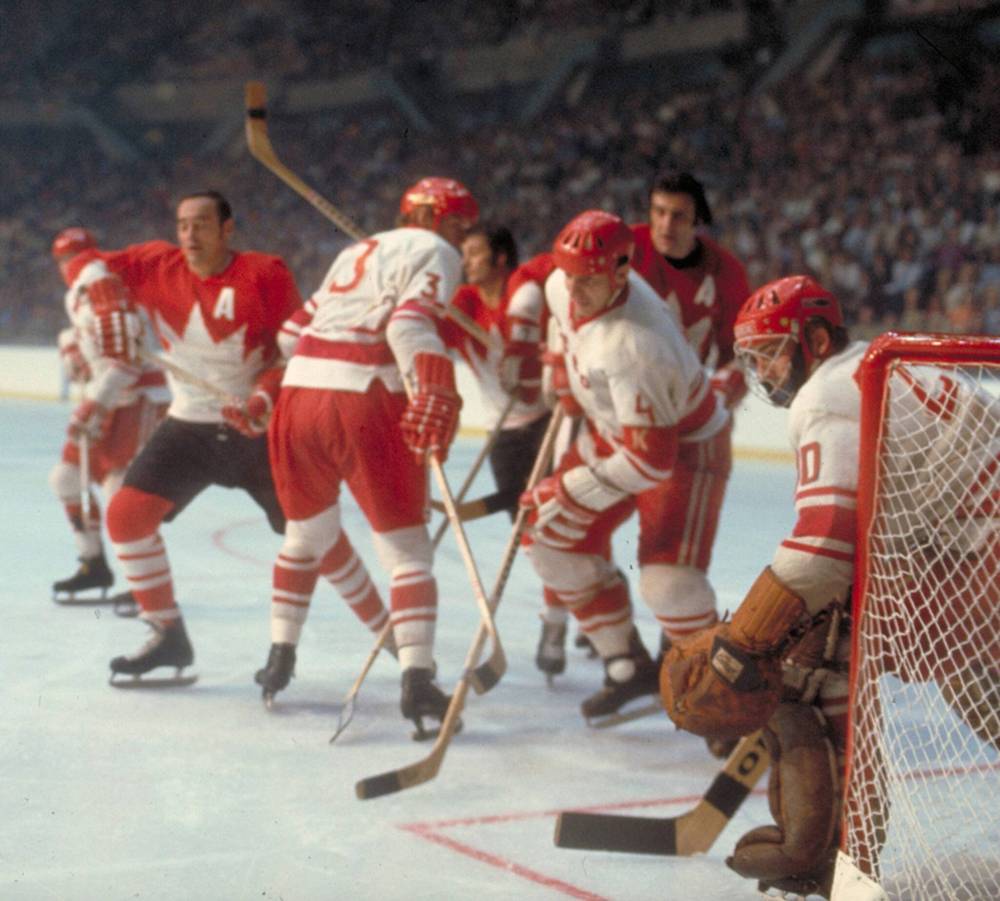
Schoolchildren across Canada were taken into school gyms to watch the final game on televisions wheeled in from libraries. Bidini remembers trying to watch the game from Moscow instead of taking part in his Grade 4 classes at Westway Public School in Etobicoke, Ont.
“You’re listening to Foster Hewitt coming out of a small speaker through this old television and the transmission from Moscow was dubious; it was just held together, literally, by a couple of wires,” he remembers.
Bidini says the NHLers were more similar to ordinary folks in 1972 when compared with today stars, and that showed in a famous post-game interview with Esposito after Canada’s Game 4 loss in Vancouver, when they were booed off the ice.
“Espo’s speech in Vancouver, you’d never get that now. Players would be so careful; I mean, they do media training,” he says. “Back then these were live, fleshy, present human beings who happen to skate and shoot pucks for a living, but you really get a sense of who they were as people and that’s what’s really fascinating to me.”
Pat Stapleton races in to help his goaltender Tony Esposito during Game Three of the Summit Series in Winnipeg, on Sept. 6, 1972. (Hockey Hall of Fame)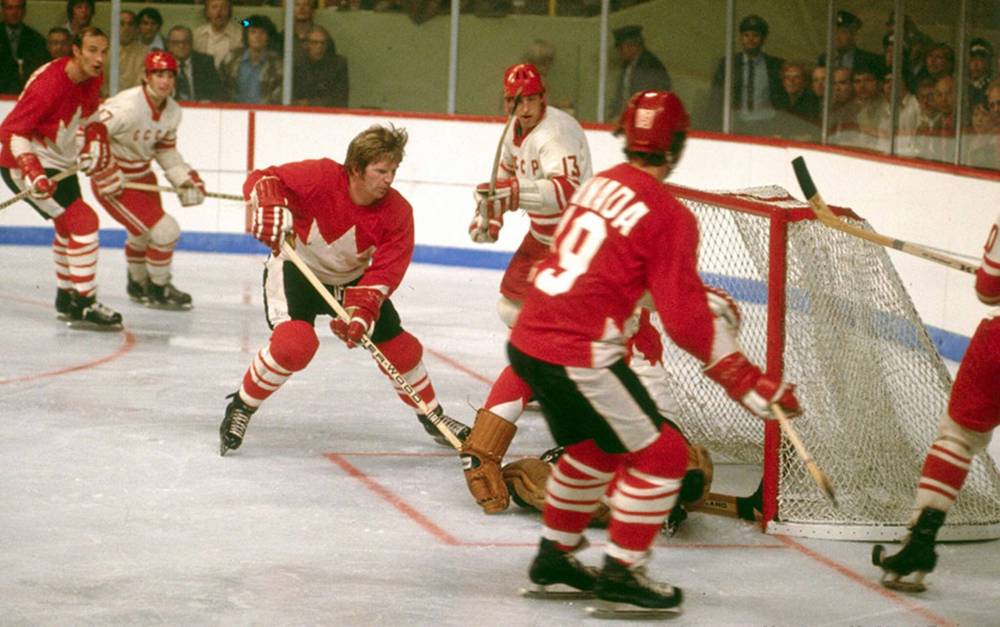
Even hockey fans who weren’t born when Paul Henderson slipped the series-winning goal past Tretiak in Game 8 in Moscow recognize the importance of the moment in Canadian history.
For Canadians older than 55 these days, sooner or later the question is asked: “Where were you in ’72?”
“I was at a meeting of (the Canadian Food Brokers Association) in Toronto and we stopped and brought a television into the meeting and watched the game. It was the highlight of the meeting,” Cribbs says with a laugh.
“I can remember that, especially the faces of the guys after Henderson scored that goal.”
Alan.Small@winnipegfreepress.com
Twitter: @AlanDSmall

Alan Small has been a journalist at the Free Press for more than 22 years in a variety of roles, the latest being a reporter in the Arts and Life section.
Our newsroom depends on a growing audience of readers to power our journalism. If you are not a paid reader, please consider becoming a subscriber.
Our newsroom depends on its audience of readers to power our journalism. Thank you for your support.

